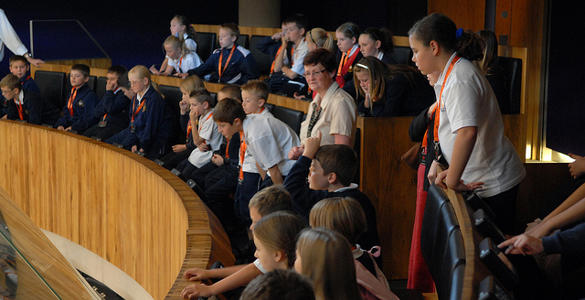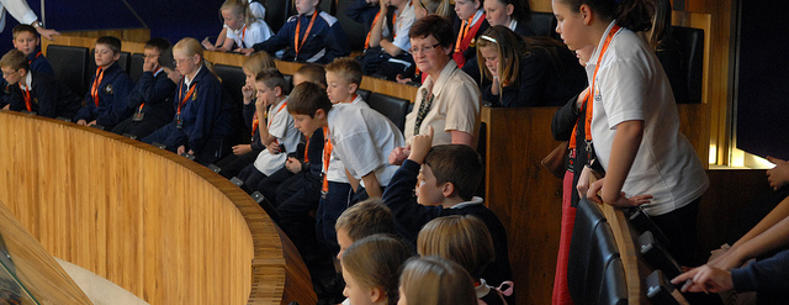Article by Siân Thomas, National Assembly for Wales Research Service
This article is taken from ‘Key issues for the Fifth Assembly’, published on 12 May 2016.
Neither seen nor heard? How prominently will children and young people’s interests feature in the Fifth Assembly?
It is said that the true character of a country is revealed by how it treats its children and young people. In the early days of devolution, Wales was seen as a leading light, with a clear focus on children and their rights. Whether they remain central to Welsh politics and policy is the subject of debate. Children’s charities claim that the 'strong tradition of child-centred policy making' which developed in the post-devolution era has become fragmented and that focus has wavered. For most groups lobbying to influence party manifestos across the devolved policy areas, their aim is to achieve ‘bigger and better’. Ironically, the main focus of the National Children’s Charities Manifesto for the Assembly Elections 2016 is lobbying to make up for lost ground. During the Fifth Assembly, the extent to which children and young people’s interests are placed at the centre of political structures and debates may be a measure by which Wales is judged on the international stage. More importantly it will be a key factor in determining the outcomes and life chances of children and young people.
The early spotlight on children and young people
Children and young people’s interests featured prominently in the Assembly’s formative years. Their welfare and protection was placed firmly on the political agenda when the findings of the Waterhouse Inquiry were published in 2000. Its findings confirmed that decades of widespread sexual and physical abuse of children had taken place in north Wales care homes. The Assembly’s early spotlight on children and young people was also partly due to the early devolution settlement. This meant that, unlike some other policy areas, the Assembly had many of the powers needed (in health, education and social services) to allow the government of the day to take forward a distinct approach to children and young people’s policy. Another factor was that some AMs who were ‘key players’ in the early Assemblies, including the First Secretary of Wales, had a shared interest and experience in issues affecting children and young people.
‘Ground-breaking’ legislation and other ‘firsts’
There are many examples post-devolution where Wales was seen to lead the way for children and young people. These include:
- Wales becoming the first country in the UK to establish a Children’s Commissioner (2001);
- the prominence given to children and young people’s issues in early Welsh Government cabinet structures, by having a minister whose portfolio and title centred on children and young people. There was also a cabinet sub-committee specifically to decide on policies affecting children and young people;
- the international recognition given when the Welsh Government of the day introduced a ‘ground-breaking’ Rights of Children and Young Person's (Wales) Measure 2011. This was the first legislation of its kind in the UK, embeding the United Nations Convention on the Rights of the Child (UNCRC) into domestic law; and
- the previous Welsh Government’s funding of Funky Dragon (the ‘Children and Young People’s Assembly for Wales’) and the progressive approach the Welsh Government itself was seen to take in promoting and supporting children and young people’s participation in decision-making at all levels.
A changing landscape for children and young people
There has been a change in how children and young people’s issues have featured in the Assembly and in Welsh Government policy. Examples include:
- a shift in ministerial responsibilities and cabinet structures for children and young people, alongside a move to more ‘all-age’ planning, policy and legislation (rather than being child-specific);
- the last Welsh Government’s decision not to introduce a Children and Young Persons (Wales) Bill as intended, on the basis that some of its provisions would be taken forward in other legislation;
- less consensus on children’s issues, demonstrated by heated debates in the Assembly about changing the law on the physical punishment of children, often referred to as a ‘smacking ban’. This was also evidenced by the questions asked about the Welsh Government’s decision not to continue its funding for Funky Dragon, instead funding work which focuses more on children and young people’s participation in government policy; and
- the then Children’s Commissioner claiming in 2014 that ‘the Welsh Government seems too comfortable with its status as an international children’s rights trailblazer’ and saying ‘vital services aimed at protecting vulnerable children and young people are in danger of being lost, due to the lack of vision and leadership from the Welsh Government’.
The last Welsh Government may have strongly rejected claims that there has been a more ‘fragmented approach’, and argued that children and young people’s interests are strengthened by having responsibilities for them embedded across all Ministerial portfolios. It may also have pointed to the wide range of policies, programmes and funding commitments in its Programme for Children and Young People, 2015.
Key decisions for the Fifth Assembly
Some key decisions which will need to be made in this Fifth Assembly include:
- Will the next Welsh Government include a minister whose portfolio centres on children and young people, and who has oversight and lead accountability for all policies affecting children and their rights? What is the likelihood of a return for a cabinet sub-committee for children?
- Will the new National Assembly committee structure include a committee which focuses on children and young people, as has been the case in all previous Assemblies?
- What next for the prospect of a National Children and Young People’s Assembly or parliament?
- How will the next Welsh Government respond to imminent recommendations from the United Nations Committeee on the Rights of the Child as a result of its formal examination of progress on children’s rights in Wales?
- What next for calls for legislation to give children equal protection from assault (a ‘smacking ban’) , potentially the most prominent children’s issue which will need to be decided by the Fifth Assembly?
Children and young people: key statistics
- Number of 0-18 year olds living in Wales: 667,300 (19-25 year olds: 298,300)
- Percentage of children officially defined as being in poverty: 31%, approximately 172,000 children
- Looked after children: 5,615
- Number of child and adolescent psychiatry referrals (aged 0-18) waiting for an appointment: 2,907
- Estimated number of children with a parent in prison: more than 2,000
- Children aged 4-5 classified as overweight or obese: 30%
- Number of homeless families with children living in temporary accommodation: 680
- Children aged 0-17 living in the most deprived parts of Wales are almost twice as likely to die as those in the least deprived parts.
Key sources
- National Children’s Charities, Manifesto for the Assembly Elections (2016)
- Office of the Children’s Commissioner for Wales, Annual Reports
- Research Service, An important time for children’s rights in Wales, Blog Post (2015)
- Summary of the United Nations Convention on the Rights of the Child
- University of Wales Press, The Rights of the Child in Wales (Hard copy) (2013) Wales UNCRC Monitoring Group, Report of the Wales United Nations Convention on the Rights of the Child Monitoring Group to the United Nations Committee on the Rights of the Child (2015) (pdf, 473.86 KB)
- Welsh Government, Programme for Children and Young People (2015)






